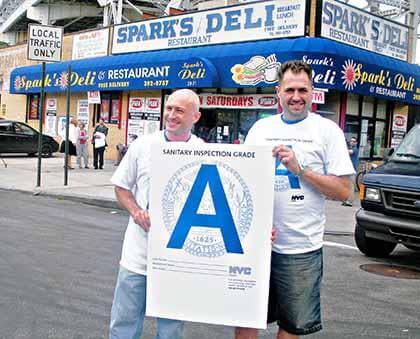By Rebecca Henely
The city Department of Health announced its new, letter-based sanitary grading system July 28 at the first business to get an “A”: Spark’s Deli at 28-31 Borden Ave. in Long Island City.
“It felt great,” co-owner Tony Araujo said. “A big load off my mind.”
In the DOH’s new system, all of the city’s 24,000 restaurants and other eating establishments will receive either an A, B or C grade based on how many violation points the eatery receives, said the department’s website. Other eating establishments are defined as coffee shops, bars, nightclubs, cafeterias, retail bakeries and fixed-site food stands.
An “A” restaurant received zero to 13 violation points, a “B” restaurant received 14 to 27 violation points and a “C” restaurant received 28 or more violation points. Points are given based on a number of standards, such as whether food is kept, served or cooked at the correct temperature; if the food is handled correctly; if the restaurant has adequate cleaning facilities and plumbing; if the restaurant has rats, mice or flies; and if employees practice the appropriate personal hygiene standards. After the restaurants receive a letter grade, they must display the grade either on the front door or window or outside wall.
The DOH estimates it will take a little over a year for every restaurant to receive a letter grade.
Tony Araujo, a Long Island resident who has been in the restaurant business for 20 years and bought Spark’s with his cousin, Jose Araujo, six years ago, said he knew about the inspection and the new lettering in advance.
But the time of the deli’s inspection — like all inspections — was unannounced. Tony Araujo said he was allowed to be present at the inspection and had any violations pointed out to him during the inspection. Spark’s received a grade of 10 violation points for a worker drinking coffee behind a counter and for a plastic shield missing from a light bulb in the refrigerator. He has been charged $800 for the violations, which he plans to contest.
“Those are very minor violations,” Tony Araujo said.
Because Spark’s received an A grade, the deli will not need to be inspected for a year, said the department’s website. When restaurants receive a B or C grade, the owners immediately get the opportunity to contest the violations with the DOH’s Administrative Tribunal and can put a “Grade Pending” sign on their storefronts. If they still receive a final B or C grade, then “B” restaurants are inspected every five to seven months and “C” restaurants are inspected every three to five months.
“I think it’s going to work pretty good,” Tony Araujo said. “It’s going to make a lot of stores clean up their act.”
In addition to the letter grade, the violations a restaurant receives will be listed for public view on the DOH’s website, said Health Commissioner Dr. Thomas Farley. All city restaurants will be kept in the database, which is searchable by name, borough, neighborhood, ZIP code, cuisine type or inspection score, said a press release from the Department of Health.
“It’s far more information than customers have now,” Farley said.
When asked whether the requirement to post the scores would drive down restaurants’ revenue, Farley said the automatic second chance was fair.
“Restaurants that have a lower score will have a better incentive to increase their practices,” he said.
Farley also argued food-borne illnesses that could be prevented by inspections were a greater cost and drive up Medicare rates.
“We have an obligation to try to prevent those illnesses,” Farley said.
Reach reporter Rebecca Henely by e-mail at rhenely@cnglocal.com or by phone at 718-260-4564.




























